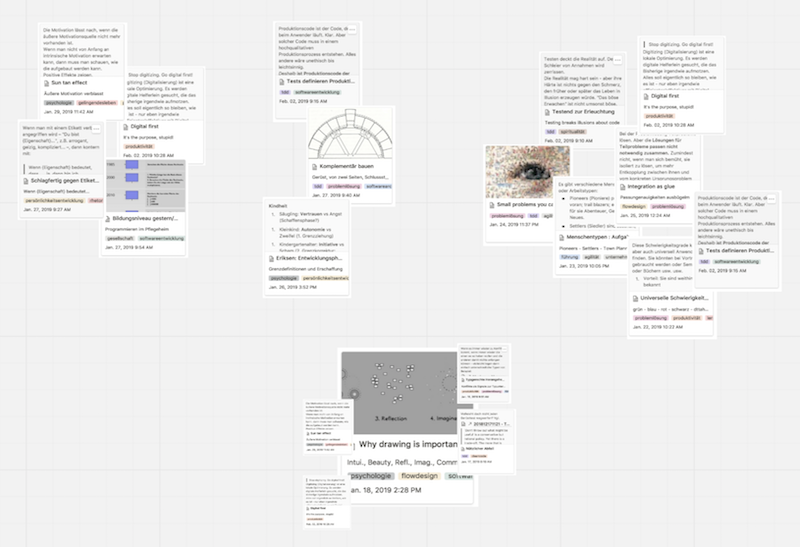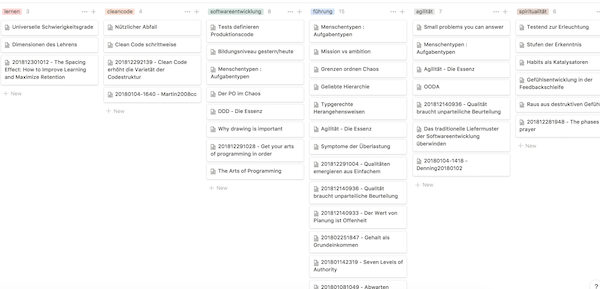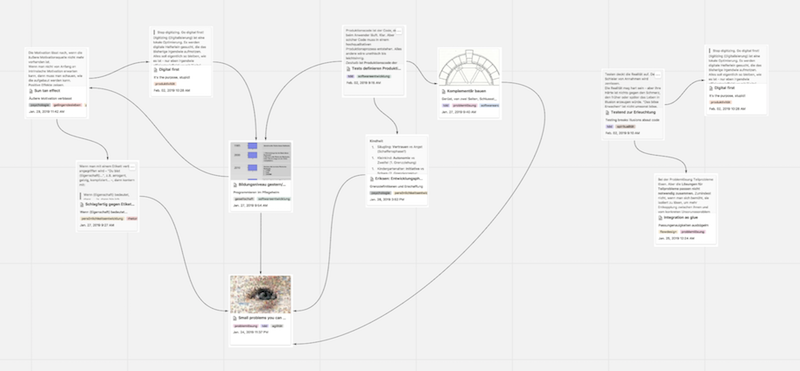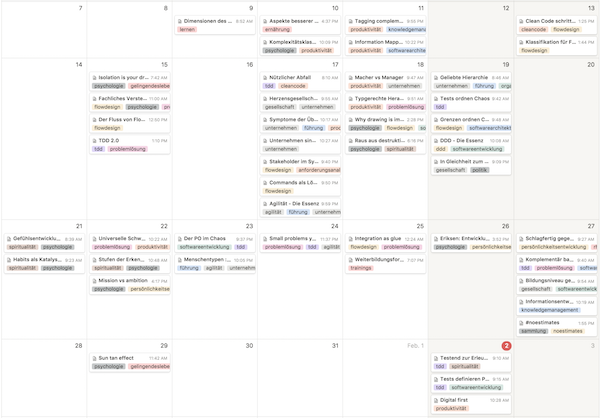Zettelkasten
- #public
- Process log
- Sorting through on April 21st, 2020 while recording a video. Spent about 20 minutes to process 17 linked references. Feels a bit slow, but I see some interesting structure emerging.
- Related concepts
- Evergreen Notes [[Note taking]] zettel
- Questions
- How to position this note in relationship with [[Note taking]]? Merge with Zettelkasten? #p
- Invented by Niklas Luhmann
- Original writings
- Videos
- Niklas Luhmann – 2016 – Ich denke ja nicht alles allein (Zettelkasten als Zweitgedächtnis)
- Secondary literature
- Books
- Book: "How to Take Smart Notes📒", Sonke Ahrens
- Die Zettelkasten methode: Kontrolliere dein Wissen
- by Sascha Fast and Christian Tietze
- Souveränität ist die Schlüsselkompetenz in unserer modernen Welt im Umgang mit Wissen und Informationen. Dabei sind Schnelligkeit, Sicherheit und Flexibilität die entscheidenden Komponenten, um diese Souveränität für sich zu gewinnen. Die Zettelkastenmethode ist eine flexible und individuell anpassbare Technik mit Wissen umzugehen. Sie ist auf jeden System mit ein paar Handgriffen realisierbar, ohne dass man komplizierte Programme verstehen muss. In ihrer Einfachheit ist sie unübertroffen und ist der (fast) unsichtbare Helfer für dich im Umgang mit dem Wissen. Niklas Luhmann, einer der produktivsten Wissenschaftler aller Zeiten, sagte einmal, er müsse gar nicht schreiben, das mache der Zettelkasten für ihn. Als ich das Prinzip hinter seinem Zettelkasten, zusammen mit Christian Tietze, in die moderne Welt der digitalen Technik übertrug, war ich überrascht, wie viel Wahrheit in Luhmanns Aussage steckt.
- Blog posts
- Books
- Places to discuss
- Zettelkasten.de
- TakingNoteNow blog, lots of great insights around [[Note taking]] and Zettelkasten, also from many earlier than Niklas Luhmann
- Theory
- Grunded theory from Ralf Westphal
- Rich picture from Ralf Westphal
- Zettelkasten as a lattice of thoughts from Zettelkasten.de by Gerrit Scholle
- https://zettelkasten.de/posts/lattice-of-thoughts/
- read February 27th, 2020 March 31st, 2020
- Dangers / pitfalls
- Dangers with Zettelkasten #[[Note taking]] #p
- https://clerestory.netlify.com/zk1/
- He warns against the seduction of densely interconnecting ideas across domains, because it can create mental models so complex that they obscure reality and discourage reality-testing.
- Collector's Fallacy - trying to capture all of the original author's intention, instead of relying on my own voice and understanding. Pasting too much raw material. Worried about missing something.
- Interfaces
- Hierarchical (like Roam)
- Writing using outlines - one sentence per bullet, hierarchy. Much easier to move things up and down (but danger of disconnected text, like I found sometimes with Scrivener when I wrote each paragraph as a stand-alone piece) - but the hierarchy helps, because when you move something that has children, they come along. Can also use folding. #bullets
- Visual
- Different formats
- <span id='T34wHZIIp'/> - <span id='efk8uysnu'/> - <span id='YN2HksdUU'/> - <span id='0tFKRvCsy'/><span id='2ND86udzv'/>
- Different formats
- Knowledge Building (with rise aboves etc) and [[Zettelkasten-p]] #Newsletter #juxtaposition
- Hierarchical (like Roam)
- Tools
- Apps
- Roam
- Roam as a Slip box from David K. Laing
- https://davidklaing.com/blog/2020/02/01/roam-as-a-slip-box.html
- Distinguishing two kinds of notes
- literature notes (paraphrases of ideas and arguments encountered during reading)
- permanent notes ("original" thoughts/insights)
- Both types of notes are written in publishable-quality prose, and each note is meant to include enough detail that it could be read and understood on its own.
- Workflow
- writes all his notes on Daily notes, tags litnote/permnote (sometimes in the same paragraph).
- https://shime.sh/how-i-apply-zettelkasten-to-roam #Newsletter #Zettelkasten
- [[Zettelkasten-p]] #video by Shu Omi #roam-workflow
- Roam as a Slip box from David K. Laing
- https://www.youtube.com/watch?v=rOSZOCoqOo8
- The Variable Schedule Reward Zettelkasten. A strategy for Memexing Twitter (to get better ideas, and build new relationships)
- Devonthink
- TinderBox by Beck Tench
- Notion, moving from The Archive from Zettelkasten.de by Ralf Westphal (@ralfw)
- https://forum.zettelkasten.de/discussion/404/moving-on#latest
- https://forum.zettelkasten.de/discussion/446/views-of-a-zk#latest
- Twitter
- https://twitter.com/houshuang/status/1232239406452531200 #myTwitterThreads
- Different formats
- Highlights ease of formatting, including images, and viewing the notes in different layouts.
- Hugo (h/t Christian Tietze)
- Vim (h/t Christian Tietze) based on vimwiki
- The Archive by André Chaperon
- org-mode by Jethro Kuan
- https://blog.jethro.dev/posts/zettelkasten_with_org/
- Roam
- Web-based tools
- zettel.io some kind of public Zettelkasten with Twitter integration?
- Apps
- Workflow
- From Zettelkasten.de (discordian) on how to use Zettelkasten to create lectures
- https://forum.zettelkasten.de/discussion/865/introduction-teaching-using-zettelkasten-and-paskian-entailment-meshes#latest
- There is a rich discussion in this thread that I haven't processed, worth coming back to Resurface March 26th, 2020
- The inspiration comes from close colleagues historian father, who had this system of writing his materials on perforated index cards and then using a steel rod to 'fish out' materials for a given lecture from a giant archive drawer. Basically, he had a mechanical tagging system and could prepare a lecture in a moment's notice with it.
- A coherence is set of three or more topics with the curious property that any topic in a given coherence is entailed by the remaining topics. For example, the Topics {Function, Data, Transformation} form a coherence, since concepts of Function and Data imply a Transformation (of the data), Transformation and Data imply a Function (specifying the transformation) and Transformation and Function imply Data (to be transformed).
- The idea seems to boil down to this: if the student knows some of the topics, an explanation for the unknown topics is implied by the coherence.
- Gordon Pasks Conversation Theory Pask arranges teaching materials into Entailment Meshes, which are build out of Topics (comparable to zettels) and arranged (mainly) into overlapping Coherences.
- Getting a sense of the power of Daily Notes. The way I am setting up my [[Zettelkasten-p]] now feels... daunting. I feel reticent to add to it, because I want the notes in there to be "permanent". Maybe this is a similar dynamic to formalism considered harmful? To support Z1: levels of processing,
- From Zettelkasten.de (discordian) on how to use Zettelkasten to create lectures
- Videos of workflows
- The Archive by André Chaperon
- https://www.youtube.com/channel/UCtGCJRJqOVeJUkPkcdHwELw<span id='rIeBjh-KL'/><span id='eMyMtVgUJ'/>
- The Archive by André Chaperon
- [[Zettelkasten-p]] #video by Shu Omi #roam-workflow
- People/connections
- Christian Wahl
- My interest in [[Zettelkasten-p]] lies in the connection between my use of systems theory and the personal aspect of using digital media.
- Christian Wahl
Referred in
Just-in-Time Project Management
#public Link:: https://praxis.fortelabs.co/series/just-in-time-project-management/ blogged http://reganmian.net/blog/2020/01/31/note…
Knowledge Compressor
#public By Joel Chan 's lab My thoughts and questions Is it open source? Why not? Plan for development - actually trying to make it useful…
Note taking
(Something about choosing good sources?) First make it easy to Capture . Progressive summarization . It’s actually good to wait a bit after…
Three levels of Note taking
Public link: https://roamresearch.com/#/app/stian-research/page/Aoq0x-csu My concept of three levels (from Roam meetup ) curious about…
If you think this note resonated, be it positive or negative, send me a direct message on Twitter or an email and we can talk.